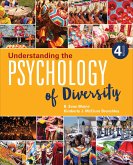Nicole M. Else-Quest, Janet Shibley Hyde
The Psychology of Women and Gender
Half the Human Experience +
Nicole M. Else-Quest, Janet Shibley Hyde
The Psychology of Women and Gender
Half the Human Experience +
- Broschiertes Buch
- Merkliste
- Auf die Merkliste
- Bewerten Bewerten
- Teilen
- Produkt teilen
- Produkterinnerung
- Produkterinnerung
With clear, comprehensive, and cutting-edge coverage, The Psychology of Women and Gender: Half the Human Experience + delivers an authoritative analysis of classical and up-to-date research from a feminist, psychological viewpoint.
Andere Kunden interessierten sich auch für
![Married Women Who Love Women Married Women Who Love Women]() Carren StrockMarried Women Who Love Women27,99 €
Carren StrockMarried Women Who Love Women27,99 €![Married Women Who Love Women Married Women Who Love Women]() Carren StrockMarried Women Who Love Women27,99 €
Carren StrockMarried Women Who Love Women27,99 €![Understanding the Psychology of Diversity Understanding the Psychology of Diversity]() Bruce E. Blaine (USA St. John Fisher College)Understanding the Psychology of Diversity153,99 €
Bruce E. Blaine (USA St. John Fisher College)Understanding the Psychology of Diversity153,99 €![The Process of Research and Statistical Analysis in Psychology The Process of Research and Statistical Analysis in Psychology]() Dawn M. McBride (USA Illinois State University)The Process of Research and Statistical Analysis in Psychology153,99 €
Dawn M. McBride (USA Illinois State University)The Process of Research and Statistical Analysis in Psychology153,99 €![The Alcoholism and Drug Abuse Client Workbook The Alcoholism and Drug Abuse Client Workbook]() Robert R. PerkinsonThe Alcoholism and Drug Abuse Client Workbook83,99 €
Robert R. PerkinsonThe Alcoholism and Drug Abuse Client Workbook83,99 €![Why Don't Women Rule the World? Why Don't Women Rule the World?]() J. Cherie StrachanWhy Don't Women Rule the World?114,99 €
J. Cherie StrachanWhy Don't Women Rule the World?114,99 €![Statistics for the Behavioral Sciences Statistics for the Behavioral Sciences]() Gregory J. PriviteraStatistics for the Behavioral Sciences209,99 €
Gregory J. PriviteraStatistics for the Behavioral Sciences209,99 €-
-
-
With clear, comprehensive, and cutting-edge coverage, The Psychology of Women and Gender: Half the Human Experience + delivers an authoritative analysis of classical and up-to-date research from a feminist, psychological viewpoint.
Hinweis: Dieser Artikel kann nur an eine deutsche Lieferadresse ausgeliefert werden.
Hinweis: Dieser Artikel kann nur an eine deutsche Lieferadresse ausgeliefert werden.
Produktdetails
- Produktdetails
- Verlag: SAGE Publications Inc
- 10 Revised edition
- Seitenzahl: 584
- Erscheinungstermin: 12. April 2021
- Englisch
- Abmessung: 478mm x 253mm x 37mm
- Gewicht: 1166g
- ISBN-13: 9781544393605
- ISBN-10: 1544393601
- Artikelnr.: 60411714
- Herstellerkennzeichnung
- Libri GmbH
- Europaallee 1
- 36244 Bad Hersfeld
- gpsr@libri.de
- Verlag: SAGE Publications Inc
- 10 Revised edition
- Seitenzahl: 584
- Erscheinungstermin: 12. April 2021
- Englisch
- Abmessung: 478mm x 253mm x 37mm
- Gewicht: 1166g
- ISBN-13: 9781544393605
- ISBN-10: 1544393601
- Artikelnr.: 60411714
- Herstellerkennzeichnung
- Libri GmbH
- Europaallee 1
- 36244 Bad Hersfeld
- gpsr@libri.de
Nicole M. Else-Quest is Associate Professor of Women's and Gender Studies and adjunct Associate Professor of Psychology and Neuroscience at the University of North Carolina at Chapel Hill. After earning her undergraduate and graduate degrees in psychology at the University of Wisconsin-Madison, she was on the faculty at Villanova University and then at the University of Maryland, Baltimore County. She has been teaching the psychology of women and gender regularly since 2004 and currently teaches a course on women in science. Else-Quest's research has been funded by the National Science Foundation and focuses on intersectionality, gender and ethnic identity development in adolescence, and diversity in STEM. She is a fellow of the American Psychological Association and a member of APA Division 35 (Society for the Psychology of Women) and Division 44 (Society for the Psychology of Sexual Orientation and Gender Diversity).
Preface
Chapter 1: Introduction
Why Study the Psychology of Women and Gender?
Sex, Gender, Transgender, and Cisgender
Sexism and Feminism
Themes in the Psychology of Women and Gender
Sources of Bias in Psychological Research
Feminist Alternatives to Biased Research
Chapter Previews
Chapter 2: Theoretical Perspectives on Gender
Psychoanalytic Theory
Social Learning Theory
Cognitive-Developmental Theory
Gender Schema Theory
Sociobiology and Evolutionary Psychology
Social Role Theory
Feminist Theories
Chapter 3: Gender Stereotypes and Gender Differences
Gender Stereotypes
Meta-Analysis
Psychological Gender Differences
The Gender Similarities Hypothesis
Androgyny
Chapter 4: The Intersection of Gender and Ethnicity
Recurring Themes
Ethnic Group Labels
An Ethnic/Cultural Critique of Psychological Research
Guidelines for Research With People of Color
Cultural Heritages of People of Color in the United States
Gender Roles and Ethnicity
Immigration
Education
Mental Health Issues
Feminisms of Color
Chapter 5: Gender and Communication
Verbal Communication
Nonverbal Communication
How Women and Nonbinary People Are Treated in Language
Toward Nonsexist Language
In Conclusion
Chapter 6: Gender and Emotion
Gender Stereotypes About Emotions
Gender and Emotional Experience and Expression
Emotional Intelligence
Emotions Beyond the Binary
The Socialization of Gendered Emotions
Chapter 7: Lifespan Development
Infancy
Childhood
Adolescence
Emerging Adulthood
Adulthood
Later Adulthood
Chapter 8: Abilities, Motivation, and Achievement
Abilities
Motivation: Expectancy-Value Theory
Achievement
The Gender Gap in STEM
Chapter 9: Gender and Work
Pay Equity and the Wage Gap
Compensation Negotiation
Gender Discrimination and Workplace Climate
Leadership and the Glass Ceiling
Work and Family Issues
Chapter 10: Biology and Gender
Genes
Basic Physiological Processes
Sex Hormones
The Brain
Chapter 11: Psychology, Gender, and Health
Gender and Health
Menstruation
Menopause
Reproduction and Health
Cancers
Trans Health Issues
Chapter 12: Gender and Sexuality
Physiology
Psychological Aspects of Gender and Sexuality
The Intersection of Gender and Race in Sexuality
Sexual Disorders and Therapy
Additional Therapies for Women's Sexual Disorders
Gender Similarities
Chapter 13: Gender and Sexual Orientation
Queer Theory
Stereotypes and Discrimination
Lesbian Culture
Sexual Orientation Development and Fluidity
Mental Health Issues
Why Do Women Become Lesbian, Bi, or Straight?
Differences Between Lesbians and Gay Men
The Intersection of Sexual Orientation and Ethnicity
Chapter 14: Gender and Victimization
Rape and Sexual Assault
Intimate Partner Violence
Sexual Harassment
Human Trafficking
Child Sexual Abuse
Looking Forward
Chapter 15: Gender and Mental Health Issues
Depression
Suicide
Alcohol- and Substance-Use Disorders
Eating Disorders
Gender and Psychotherapy
Chapter 16: The Psychology of Men and Masculinity
The Psychology of Men and Masculinity
The Gender Role Identity Paradigm
The Gender Role Strain Paradigm
Lifespan Development
Male Sexuality
Men of Color
Health Issues
Psychotherapy With Boys and Men
Chapter 17: Retrospect and Prospect
Future Research
Feminism Revisited
Re-Visioning Theory
The Continuing Feminist Revolution and Backlash
Glossary
Bibliography
Author Index
Subject Index
About the Authors
Chapter 1: Introduction
Why Study the Psychology of Women and Gender?
Sex, Gender, Transgender, and Cisgender
Sexism and Feminism
Themes in the Psychology of Women and Gender
Sources of Bias in Psychological Research
Feminist Alternatives to Biased Research
Chapter Previews
Chapter 2: Theoretical Perspectives on Gender
Psychoanalytic Theory
Social Learning Theory
Cognitive-Developmental Theory
Gender Schema Theory
Sociobiology and Evolutionary Psychology
Social Role Theory
Feminist Theories
Chapter 3: Gender Stereotypes and Gender Differences
Gender Stereotypes
Meta-Analysis
Psychological Gender Differences
The Gender Similarities Hypothesis
Androgyny
Chapter 4: The Intersection of Gender and Ethnicity
Recurring Themes
Ethnic Group Labels
An Ethnic/Cultural Critique of Psychological Research
Guidelines for Research With People of Color
Cultural Heritages of People of Color in the United States
Gender Roles and Ethnicity
Immigration
Education
Mental Health Issues
Feminisms of Color
Chapter 5: Gender and Communication
Verbal Communication
Nonverbal Communication
How Women and Nonbinary People Are Treated in Language
Toward Nonsexist Language
In Conclusion
Chapter 6: Gender and Emotion
Gender Stereotypes About Emotions
Gender and Emotional Experience and Expression
Emotional Intelligence
Emotions Beyond the Binary
The Socialization of Gendered Emotions
Chapter 7: Lifespan Development
Infancy
Childhood
Adolescence
Emerging Adulthood
Adulthood
Later Adulthood
Chapter 8: Abilities, Motivation, and Achievement
Abilities
Motivation: Expectancy-Value Theory
Achievement
The Gender Gap in STEM
Chapter 9: Gender and Work
Pay Equity and the Wage Gap
Compensation Negotiation
Gender Discrimination and Workplace Climate
Leadership and the Glass Ceiling
Work and Family Issues
Chapter 10: Biology and Gender
Genes
Basic Physiological Processes
Sex Hormones
The Brain
Chapter 11: Psychology, Gender, and Health
Gender and Health
Menstruation
Menopause
Reproduction and Health
Cancers
Trans Health Issues
Chapter 12: Gender and Sexuality
Physiology
Psychological Aspects of Gender and Sexuality
The Intersection of Gender and Race in Sexuality
Sexual Disorders and Therapy
Additional Therapies for Women's Sexual Disorders
Gender Similarities
Chapter 13: Gender and Sexual Orientation
Queer Theory
Stereotypes and Discrimination
Lesbian Culture
Sexual Orientation Development and Fluidity
Mental Health Issues
Why Do Women Become Lesbian, Bi, or Straight?
Differences Between Lesbians and Gay Men
The Intersection of Sexual Orientation and Ethnicity
Chapter 14: Gender and Victimization
Rape and Sexual Assault
Intimate Partner Violence
Sexual Harassment
Human Trafficking
Child Sexual Abuse
Looking Forward
Chapter 15: Gender and Mental Health Issues
Depression
Suicide
Alcohol- and Substance-Use Disorders
Eating Disorders
Gender and Psychotherapy
Chapter 16: The Psychology of Men and Masculinity
The Psychology of Men and Masculinity
The Gender Role Identity Paradigm
The Gender Role Strain Paradigm
Lifespan Development
Male Sexuality
Men of Color
Health Issues
Psychotherapy With Boys and Men
Chapter 17: Retrospect and Prospect
Future Research
Feminism Revisited
Re-Visioning Theory
The Continuing Feminist Revolution and Backlash
Glossary
Bibliography
Author Index
Subject Index
About the Authors
Preface
Chapter 1: Introduction
Why Study the Psychology of Women and Gender?
Sex, Gender, Transgender, and Cisgender
Sexism and Feminism
Themes in the Psychology of Women and Gender
Sources of Bias in Psychological Research
Feminist Alternatives to Biased Research
Chapter Previews
Chapter 2: Theoretical Perspectives on Gender
Psychoanalytic Theory
Social Learning Theory
Cognitive-Developmental Theory
Gender Schema Theory
Sociobiology and Evolutionary Psychology
Social Role Theory
Feminist Theories
Chapter 3: Gender Stereotypes and Gender Differences
Gender Stereotypes
Meta-Analysis
Psychological Gender Differences
The Gender Similarities Hypothesis
Androgyny
Chapter 4: The Intersection of Gender and Ethnicity
Recurring Themes
Ethnic Group Labels
An Ethnic/Cultural Critique of Psychological Research
Guidelines for Research With People of Color
Cultural Heritages of People of Color in the United States
Gender Roles and Ethnicity
Immigration
Education
Mental Health Issues
Feminisms of Color
Chapter 5: Gender and Communication
Verbal Communication
Nonverbal Communication
How Women and Nonbinary People Are Treated in Language
Toward Nonsexist Language
In Conclusion
Chapter 6: Gender and Emotion
Gender Stereotypes About Emotions
Gender and Emotional Experience and Expression
Emotional Intelligence
Emotions Beyond the Binary
The Socialization of Gendered Emotions
Chapter 7: Lifespan Development
Infancy
Childhood
Adolescence
Emerging Adulthood
Adulthood
Later Adulthood
Chapter 8: Abilities, Motivation, and Achievement
Abilities
Motivation: Expectancy-Value Theory
Achievement
The Gender Gap in STEM
Chapter 9: Gender and Work
Pay Equity and the Wage Gap
Compensation Negotiation
Gender Discrimination and Workplace Climate
Leadership and the Glass Ceiling
Work and Family Issues
Chapter 10: Biology and Gender
Genes
Basic Physiological Processes
Sex Hormones
The Brain
Chapter 11: Psychology, Gender, and Health
Gender and Health
Menstruation
Menopause
Reproduction and Health
Cancers
Trans Health Issues
Chapter 12: Gender and Sexuality
Physiology
Psychological Aspects of Gender and Sexuality
The Intersection of Gender and Race in Sexuality
Sexual Disorders and Therapy
Additional Therapies for Women's Sexual Disorders
Gender Similarities
Chapter 13: Gender and Sexual Orientation
Queer Theory
Stereotypes and Discrimination
Lesbian Culture
Sexual Orientation Development and Fluidity
Mental Health Issues
Why Do Women Become Lesbian, Bi, or Straight?
Differences Between Lesbians and Gay Men
The Intersection of Sexual Orientation and Ethnicity
Chapter 14: Gender and Victimization
Rape and Sexual Assault
Intimate Partner Violence
Sexual Harassment
Human Trafficking
Child Sexual Abuse
Looking Forward
Chapter 15: Gender and Mental Health Issues
Depression
Suicide
Alcohol- and Substance-Use Disorders
Eating Disorders
Gender and Psychotherapy
Chapter 16: The Psychology of Men and Masculinity
The Psychology of Men and Masculinity
The Gender Role Identity Paradigm
The Gender Role Strain Paradigm
Lifespan Development
Male Sexuality
Men of Color
Health Issues
Psychotherapy With Boys and Men
Chapter 17: Retrospect and Prospect
Future Research
Feminism Revisited
Re-Visioning Theory
The Continuing Feminist Revolution and Backlash
Glossary
Bibliography
Author Index
Subject Index
About the Authors
Chapter 1: Introduction
Why Study the Psychology of Women and Gender?
Sex, Gender, Transgender, and Cisgender
Sexism and Feminism
Themes in the Psychology of Women and Gender
Sources of Bias in Psychological Research
Feminist Alternatives to Biased Research
Chapter Previews
Chapter 2: Theoretical Perspectives on Gender
Psychoanalytic Theory
Social Learning Theory
Cognitive-Developmental Theory
Gender Schema Theory
Sociobiology and Evolutionary Psychology
Social Role Theory
Feminist Theories
Chapter 3: Gender Stereotypes and Gender Differences
Gender Stereotypes
Meta-Analysis
Psychological Gender Differences
The Gender Similarities Hypothesis
Androgyny
Chapter 4: The Intersection of Gender and Ethnicity
Recurring Themes
Ethnic Group Labels
An Ethnic/Cultural Critique of Psychological Research
Guidelines for Research With People of Color
Cultural Heritages of People of Color in the United States
Gender Roles and Ethnicity
Immigration
Education
Mental Health Issues
Feminisms of Color
Chapter 5: Gender and Communication
Verbal Communication
Nonverbal Communication
How Women and Nonbinary People Are Treated in Language
Toward Nonsexist Language
In Conclusion
Chapter 6: Gender and Emotion
Gender Stereotypes About Emotions
Gender and Emotional Experience and Expression
Emotional Intelligence
Emotions Beyond the Binary
The Socialization of Gendered Emotions
Chapter 7: Lifespan Development
Infancy
Childhood
Adolescence
Emerging Adulthood
Adulthood
Later Adulthood
Chapter 8: Abilities, Motivation, and Achievement
Abilities
Motivation: Expectancy-Value Theory
Achievement
The Gender Gap in STEM
Chapter 9: Gender and Work
Pay Equity and the Wage Gap
Compensation Negotiation
Gender Discrimination and Workplace Climate
Leadership and the Glass Ceiling
Work and Family Issues
Chapter 10: Biology and Gender
Genes
Basic Physiological Processes
Sex Hormones
The Brain
Chapter 11: Psychology, Gender, and Health
Gender and Health
Menstruation
Menopause
Reproduction and Health
Cancers
Trans Health Issues
Chapter 12: Gender and Sexuality
Physiology
Psychological Aspects of Gender and Sexuality
The Intersection of Gender and Race in Sexuality
Sexual Disorders and Therapy
Additional Therapies for Women's Sexual Disorders
Gender Similarities
Chapter 13: Gender and Sexual Orientation
Queer Theory
Stereotypes and Discrimination
Lesbian Culture
Sexual Orientation Development and Fluidity
Mental Health Issues
Why Do Women Become Lesbian, Bi, or Straight?
Differences Between Lesbians and Gay Men
The Intersection of Sexual Orientation and Ethnicity
Chapter 14: Gender and Victimization
Rape and Sexual Assault
Intimate Partner Violence
Sexual Harassment
Human Trafficking
Child Sexual Abuse
Looking Forward
Chapter 15: Gender and Mental Health Issues
Depression
Suicide
Alcohol- and Substance-Use Disorders
Eating Disorders
Gender and Psychotherapy
Chapter 16: The Psychology of Men and Masculinity
The Psychology of Men and Masculinity
The Gender Role Identity Paradigm
The Gender Role Strain Paradigm
Lifespan Development
Male Sexuality
Men of Color
Health Issues
Psychotherapy With Boys and Men
Chapter 17: Retrospect and Prospect
Future Research
Feminism Revisited
Re-Visioning Theory
The Continuing Feminist Revolution and Backlash
Glossary
Bibliography
Author Index
Subject Index
About the Authors








